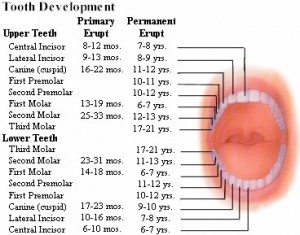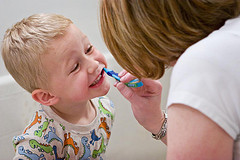 Recently we talked about when you should begin to see your child’s first teeth start to break through; now let’s discuss those all important permanent teeth. After the primary or baby teeth are all in, most Mom and Dads probably don’t give much thought as to when they should start to fall out and the permanent teeth begin to make an appearance.
The first permanent teeth commonly start to come in around the age of 6 and they don’t erupt in the same order as the primary teeth. For example, generally the first baby teeth to come in are the lower and upper central incisors, better known as the front teeth. For the permanent teeth, both the top and bottom first molar will almost always emerge first, then the central incisors around the age of 7 and 8, followed by the lateral incisors between the ages of 8 and 9.
Recently we talked about when you should begin to see your child’s first teeth start to break through; now let’s discuss those all important permanent teeth. After the primary or baby teeth are all in, most Mom and Dads probably don’t give much thought as to when they should start to fall out and the permanent teeth begin to make an appearance.
The first permanent teeth commonly start to come in around the age of 6 and they don’t erupt in the same order as the primary teeth. For example, generally the first baby teeth to come in are the lower and upper central incisors, better known as the front teeth. For the permanent teeth, both the top and bottom first molar will almost always emerge first, then the central incisors around the age of 7 and 8, followed by the lateral incisors between the ages of 8 and 9.
The canine teeth are next to show up but for some reason the bottom cuspid generally arrives when the child is around 9 or 10 while the top cuspid doesn’t make its debut until about a year later. Both the first and second premolars, or bicuspids, can push through anytime from the ages of 10 until the age of 12 and then look for the second molar between the ages of 12 and 13.
By the age of 14 most children will have 28 teeth and then the teeth take a break for several years until the emergence of the third set of molars or wisdom teeth. Anywhere from one to four wisdom teeth typically arrive between the ages of 17 to 25 i.e., the age of wisdom. Research has shown while approximately 95 percent of all adults eventually get wisdom teeth, 90 percent of these teeth will either be partially or totally impacted and almost always require oral surgery.
While your child’s teeth are coming in make sure they stay healthy by contacting Ellis Dental today to schedule a checkup. Depending on their age we can also look to see how those pesky wisdom teeth are doing.

